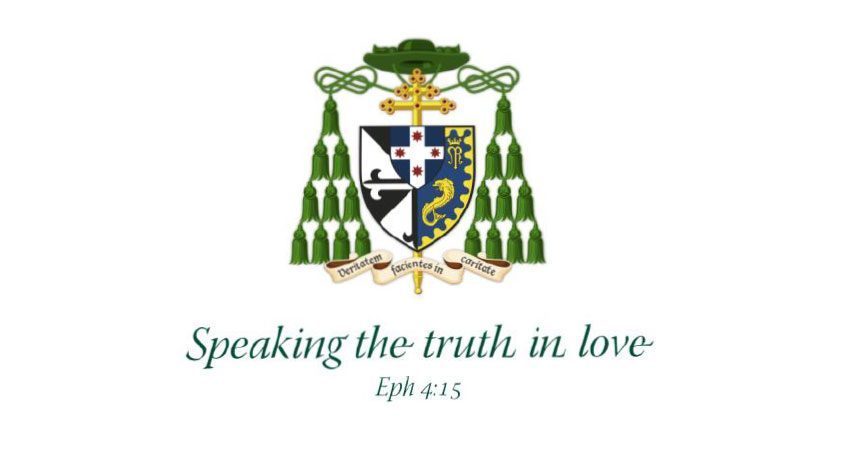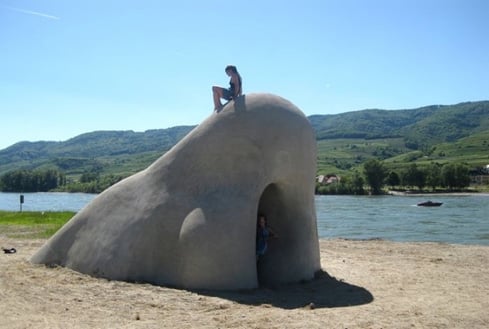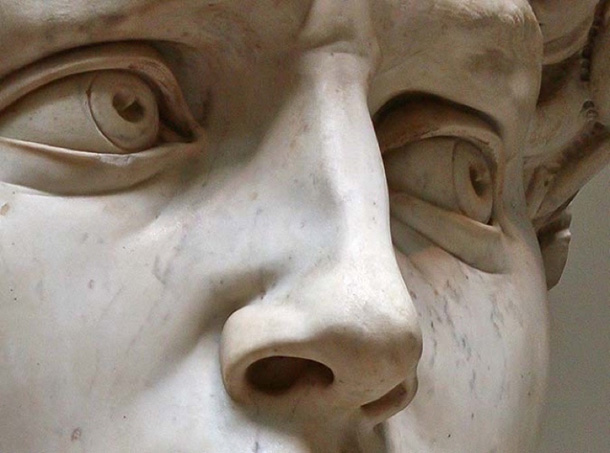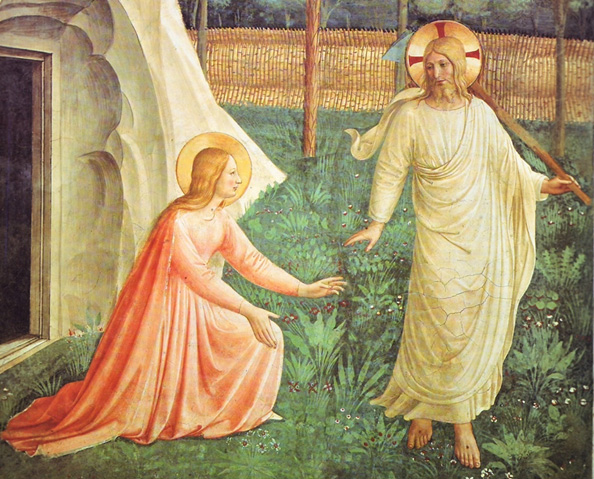HOMILY FOR THE CHRISM MASS

St Mary’s Basilica, Sydney
It’s a smelly Mass, the Chrism Mass. The scent of palms is still in the air from last Sunday. Then that of the olive permeates the cathedral, as deacons heave vats of oil up the sanctuary stairs. Then perfume fills the basilica as it is mixed with the sacred Chrism for the fragrance of Christ.
Our sacramental economy joins fleshly humans to the spiritual realm and so the Sacred Liturgy necessarily engages the senses. Son et lumière most obviously, for the Liturgy is sacred drama, with sounds of prayer and song, bell and organ, and sights of processions and postures, fabric and metal, art and architecture, by light of candle or leaded window. Taste comes into play as well, as the accidents of bread and wine veil Sacred Flesh and Blood. Touch also, as oil and water and even skin- upon-skin effect the sacraments.

But even that least considered member, the nose, and most neglected sense, smell, are drawn into the mysteries by aromas not just of palm, olive and perfume, but of smoke, incense and ashes, bread and wine, oil and wax, flowers and pine needles…
Smell may be the least attended sense but as Paul observed of Christ’s body the Church, even the least considered member has its place in the whole (1Cor ch 12). We use our noses to breathe, filter and smell, carry spectacles and sneeze annoyances away. As infants we know the scent of our mother and mother’s milk. As we grow, we learn to distinguish smells, discerning whether food is fresh or the air we breathe. We are consciously attracted to perfumes and unconsciously to pheromones. We delight in the smell of bread baking, garlic and ginger frying, or sea air. We recoil from b.o., sewage and other stenches. Our culinary world is an intricate interchange of taste, smell, look and texture. We use smelly oils for massage and burning, fragrant flowers for romance and funerals. Like our Aboriginal and Jewish ancestors, we use holy smoke in ritual, but respond to other kinds of smoke with alarm. Some even communicate with their noses, by rubbing, tapping or wiggling them, or breathe through their nose when playing the sax or digeridoo.
Like so much else in life we mostly take our noses for granted and are most aware of them when they are compromised by colds, hay-fever or blocked sinuses, when runny, bloody or broken, or when losing their sensitivity with age.
In popular parlance we speak of people paying through the nose, cutting off their nose to spite their face, or sticking their nose into other people’s business. Others powder their nose, win by a nose, have their nose rubbed in it, or are given a bloody nose. We also speak of things being right under our nose, or as plain as the nose on our face, or no skin off our nose. Critics say the Church today is on the nose, the faithful being led by the nose, their pastors seeing no further than their noses. But we’ve had saints with a nose for sin or heresy, who kept their nose clean or to the grindstone, who died ‘in the odour of sanctity’, or whose relics came up smelling of roses.
The nose, then, has a complex natural function and even more complex symbolic associations. And like all human realities, these are taken up into the sacred realm. In the biblical text God breathes spirit or breath into our nostrils to give us life (Gen 2:7). Smells please, deceive or repel God and others.[1] Incense was offered in the Temple[2] and believers think it the smell of God. Idols have noses but they cannot smell (Dt 4:28; Ps 115:6; Sir 30:9): only human beings reflect upon what sensations mean (e.g. Rev 5:8).

We can picture the infant Lord brought sweet-scented frankin-cense and medicinal-smelling myrrh by wise men (Mt 2:11); or as a boy learning from His Mum to distinguish the mint, dill, cumin and mustard which would populate His parables (e.g. Mt 13:31-2; 23:23; Lk 11:42) or smelling the wood in His father’s workshop; or as an adult gad-about sensing the aromas of the flowers, corn and beasts of the field, fish of the lake, parchment in the synagogue, crowds in the city… He blew His nose as He wept for Lazarus and for Jerusalem (Jn 11:35; Lk 19:41); held His nose amidst the stench of animal slaughter and holocaust in the Temple (Lk 22:7; Jn 2:15 etc.); enjoyed the perfumed nard with which a woman anointed His feet (Mk 14:3-9 et par.). Jesus is the nose of God breathing in every human experience and emotion. In the prophets the faithful of Israel are called “fragrant offerings, acceptable and pleasing to God” and in Paul faithful Christians (Ezek 20:41; Hos 14:6; Phil 4:15).
It’s a smelly Mass, the Chrism Mass, for it is the Mass that makes the oils for our sacraments, those most fragrant offerings of God’s fragrant people. Anointing is mentioned in three of our readings today , and ‘This text is being fulfilled today even as you listen.’ (Lk 4:16-21; Isa 61:1-9; Ps 88:21-27 ) The prayer of consecration of the Chrism refers to Baptism cleansing the new Christian of the stench of sin so they might “give forth the fragrance of an innocence of life pleasing to God”. Baptism, Confirmation, Ordination and Anointing for the Sick and Dying are all sacraments of smell. There we encounter the scents of Christian initiation, vocation and healing, the true odours of sanctity. And these ordinary means of salvation receive their extraordinary meaning and power from that Sacred Triduum we begin today.
On the evening of this Maundy Thursday we smell the roast lamb and bitter herbs of the Passover, the dirty feet and cleansing water of the Mandatum, the unleavened bread and new wine of the Eucharist. In a few short verses, then, we smell sacrifice, worship, and service. Our senses are bombarded as are our hearts, as we leave that Upper Room for the Garden, the palms and olive branches recalling Palm Sunday past but now become tokens of the Passion. Tonight we smell fear, as some animals can, amidst the odours of soldiers, chains and prison cells. How easily the mood changes and how complex our feelings on this Night that smells of both service and dread.
Come tomorrow there will be even more confronting pong of human bodies, torture and death: blood, sweat and tears, leather, wood and iron, vinegar and hyssop, dank tomb and funerary spices. Our final smell is the very one with which the Lord’s story began, as the lords of the earth honoured and warned the infant King with myrrh, the spice murmuring that His life would be short and sacrificial. Now we smell that herb once more, on that day when humanity kills its God and God enters into the deepest solidarity with the suffering and dead. God descends to the Limbo of all victims of human hate and indifference, and of so-called “acts of God” such as the bush-fires, floods and viruses that have recently caused us so much grief. Good Friday smells of cruelty and oblivion.

Yet this stench, we know, is not the end. Easter begins with the smells of disappointed apostles huddled in a locked room, of confused holy women with their unused spices, of sweaty Peter and John running to an empty tomb. But there are also the perfumes of a garden where the Magdalene mistakes the Risen Lord for gardener, and of bread when excited disciples recognise Him at the first Eucharists. People speak of the odour of sanctity associated with the remains of saints: how much more beautiful must the source of that perfume have been, our Risen Lord? (Cf. 2Cor 2:15; Eph 5:2)
If the scents of tonight tell of service and anxiety, and those of tomorrow of violence and grief, Sunday’s will be the perfumes of triumph and hope. But it all begins this very morning, as we smell the beginnings of the sacraments that will mediate those moods and mysteries to us and the beginnings of the priesthood that will be agents of those graces.
Thanks be to God for the gift of the sacraments! Thanks be to God for the priests of Sydney who dispense them!
Word of Thanks after the Chrism Mass
St Mary’s Basilica, Sydney, 1 April 2021
My thanks to you, my brother bishops and priests, who renewed your priestly vows today and daily renew that commitment by your service to God and His people. The oils we consecrated highlight your everyday work and, on behalf of the Church of Sydney, I thank you for that service, especially in such strange and pastorally demanding times.
The Holy Oils will be distributed by our beloved seminarians of the Redemptoris Mater and Good Shepherd Seminaries. The Oils will be available for collection outside the Eastern Doors of the Cathedral after Mass and after lunch in the Cathedral Hall. For COVID-safety reasons we have moved our lunch to that larger space this year.
My thanks to our MC, deacons, seminarians, servers and choir. I am grateful also to the faithful of Sydney who joined us today physically or virtually, and who join their priests in celebrating the sacraments all year round. May God bless you, dear Fathers, and your people in the Sacred Triduum, through Eastertide and beyond.
Introduction to the Chrism Mass
St Mary’s Basilica, Sydney
Welcome to this year’s Chrism Mass. As we consecrate the oils today we rejoice that we are again able to celebrate together, in one place, in Holy Week, and in full voice. With such a number of you here today, my heart is full with gratitude that we have come through so much so well. But the situation in Queensland, in Rome and in so many other places underlines just how fortunate we have been, how careful we must continue to be, and the need to hold up to God in prayer our less fortunate brothers and sisters.
Today our shepherds will join me in renewing their priestly promises, as testimony to our communion with Christ; they will join me in celebrating the Holy Eucharist, as tribute to our communion with each other; and they will join me in consecrating the oils for the sacraments, as demonstration of our communion with the people we serve. I acknowledge amongst them auxiliary Bishops of Sydney Terry Brady and Richard Umbers, Ordinary of the Ordinariate of the Southern cross Monsignor Carl Reid, Vicar-General Gerry Gleeson, Dean Don Richardson, the seminary rectors, episcopal vicars and deans, all priests, deacons and religious, and our beloved seminarians. I also welcome representatives of our parishes.
We pray for those who could not be with us today due to sickness and frailty; and we pray for the repose of those who have died since our last Chrism Mass in October: Bishops Geoffrey Robinson and Bede Heather, and Fathers Bob Flaherty, Isidore Anantharaj and Barry Swift. Several religious priests who worked for or around our archdiocese have also returned to the Father, including Marist Fathers Maurie Sullivan and Bob Barber.
Today we celebrate with gratitude those priests who have achieved major milestones in their ministry: in particular, our diamond jubilarians John Alt, Ed Campion, Bill Challenor and Vince Redden, with religious Garry Reynolds SM and Alberic Jacavone OSB, our golden boys Greg Flynn, Peter Lynch and Ed Travers MSC, 40 years ordained Jerzy Chrzczonowicz, Peter Carroll and Tadeusz Przybylak SChr, and our silver jubilarians Darryl Mackie, Tomasz Nowak SChr, Gerard Prindiville and Reinaldo Vassoler CS – and any others I’ve missed!
We also welcome several newly ordained deacons to our ranks since October: Raymond Hung, Anderson Gallego Rodas, Rafael Silva Galicia and Daniel Drum FMVD; and a new priest in Reginald Chua OP. Sixteen other clergy have come to work or to retire in our Archdiocese in the last four months. We welcome seminarians from both Sydney seminaries, looking forward to the day when they will renew priestly vows with us and join us at the altar. To everyone present, a very warm welcome.
[1] E.g. smells please (Gen 8:21; Ex 29:18,25,41; 30:23; Lev 1:9,13; 2:2; 4:31; 23:18; Ezek 6:13; Ps 141:2; Song 1:12; 2:13; 4:10-11; 7:8; Sir 38:11; Eph 5:2; Rev 5:8), deceive (Gen 27:27; 2Chr 26:16) or repel (Ex 7:21; 16:20; Is 1:13; 3:24; 6:1; Joel 2:20; Tobit 6:18; Eccles 10:1) God or others.
[2] Ex chs 25 & 30; 31:8,11; 35:8,15,28; 37:16,25,29; 39:38; 40:5,26-7; Lev 4:7; 10:1; 16:12-3; 26:30; Num 4:7,16; chs 7 & 16; Dt 33:10; 1Sam 2:28; 1Kings 3:3; 7:50; 11:8; 12:33; 13;1-2; 22:43; 2Kings 25:14; 1Chr 6:49; 9:29; 28:18; 2Chr 2:4; 13:11; 14:5; 26:16,19; 30:14; 34:4,7; Tob 6:17; Judith 9:1; 1Macc 1:55; 4:49-50; 2Macc 2:5; 10:3; 4:49; Ps 141:2; Prov 27:9; Wis 12:27; 18:21; Sir 24:15; 39:14; 45:16; 49:1; 50:9; Isa 1:13; 17:8; 27:9; 65:3,7; Jer 41:5; Bar 2:10; 6:42; Ezek 6:4-6; 8:11; 16:18; 23:41; Dan 3:38; Hos 2:13; 11:2; Mal 1:11; cf. Lk 1:9-11; Heb 9:3-4; Rev 5:8; 8:3-4; 18:13.

